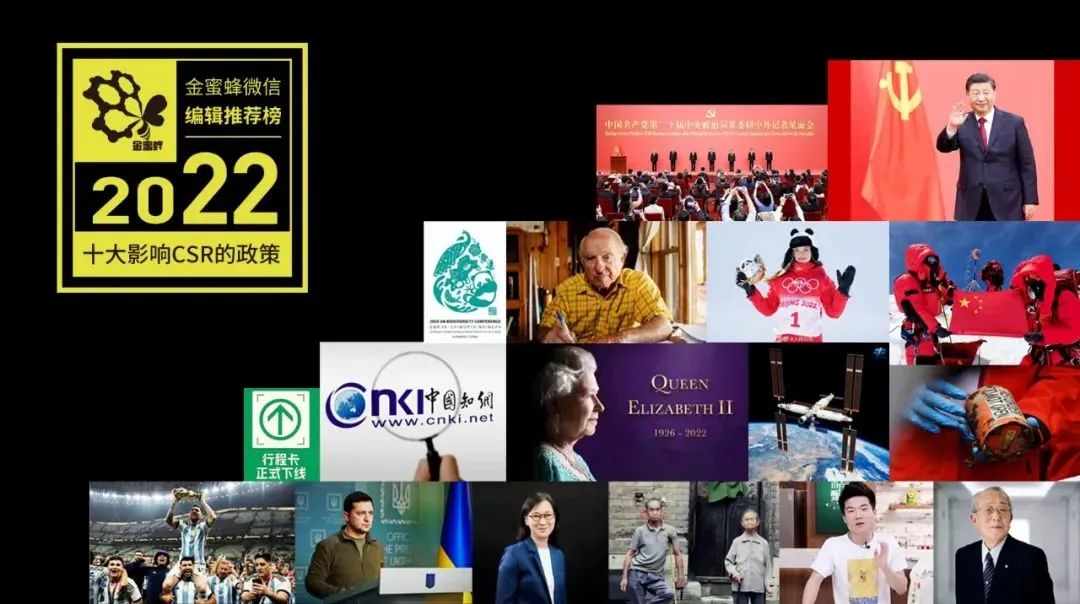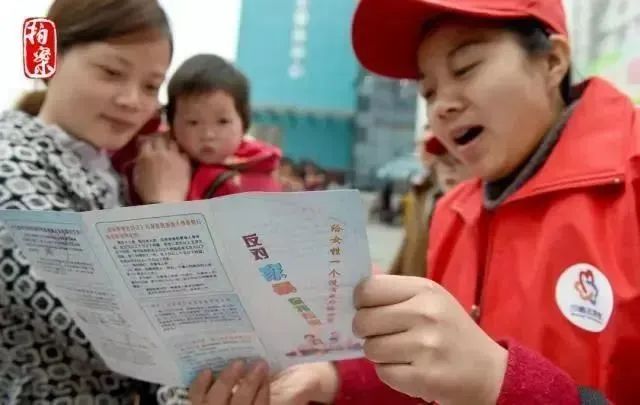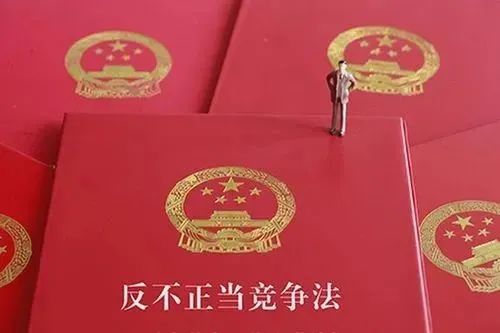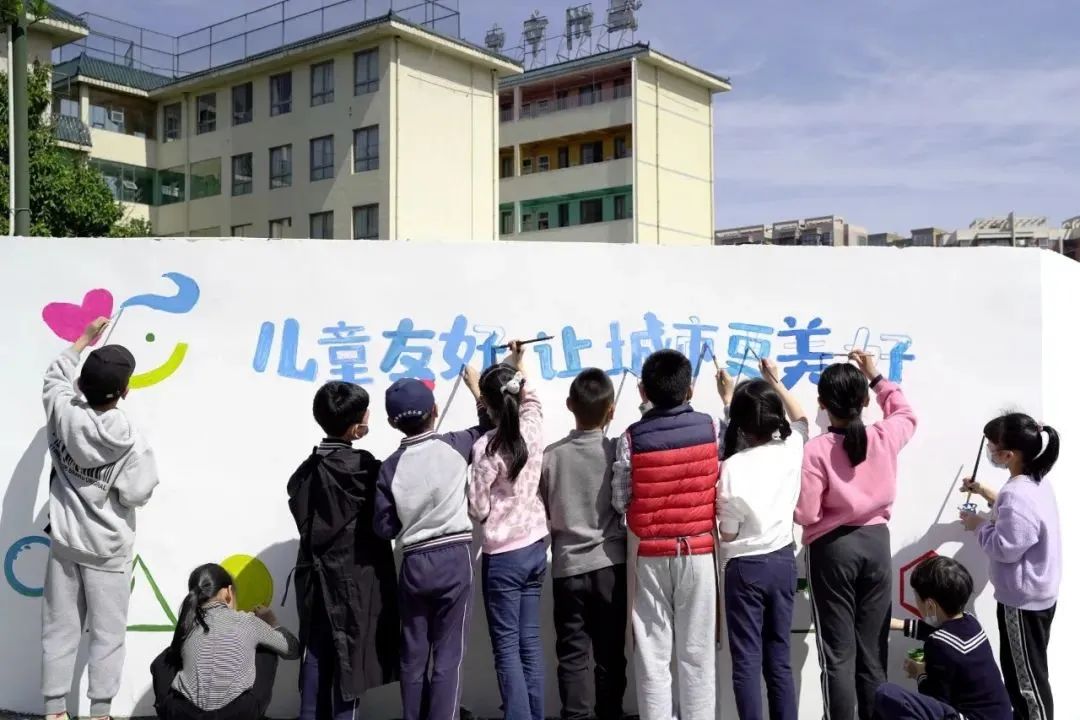Top 10 Chinese Policies Influencing CSR in 2022
2023-02-01未知责任编辑0

On the occasion of bidding farewell to 2022, the GoldenBee WeChat Editor's Recommended List kicked off to greet everyone with CSR spotlights, discussing the changes of this year. This is not only a kind of discovery and perseverance, but also a kind of transcendence and leapfrogging. This time, we share with readers the top ten Chinese policies that influence CSR in 2022 from perspectives of editors (in chronological order of news release).
Among them, there are platform algorithms, children-friendly new standards and regulation, as well as huge progress in green consumption, and brand building. From understanding trends to establishing advantages, let's take a look at what policies are on the list this year, and which policies may have a far-reaching impact.
01
Five national standards about sewage recycling issued

On January 19, 2022, the State Administration of Market Regulation (Standardization Administration of China, SAC) recently approved and issued five recommended national standards on wastewater recycling, including the Water Reuse Guidelines — Water Quality Management for Water Reclamation Plants (the Guidelines), to promote the safe and efficient use of unconventional water sources including reclaimed water, and the intensive use of water resources. These five standards include 3 guidelines for water reclamation, 1 for the integration and optimization of water system, and 1 for mine water utilization, filling the gap of domestic standards in sewage recycling. The Guidelines stipulate the classification of reclaimed water with urban sewage as the water source, the objectives, measures, detection, monitoring, reporting and system of water quality management in the reclaimed water plant, and the index system, procedures and requirements for evaluating wastewater regeneration treatment technology and process. The Technical Guide for Water System Integration and Optimization of Industrial Enterprises offers specific implementation guide for the investigating the status quo of water system integration optimization and effect evaluation of enterprises in steel, petroleum refining, paper making, alcohol, viscose fiber and chemical fiber filament weaving and other industries. The Technical Guideline for Comprehensive Utilization of Mine Water specifies the technical requirements of mine water as industrial water, miscellaneous water, ecological environment water, farmland irrigation water, and domestic drinking water, effectively guiding the comprehensive utilization of mine water.
Some SAC official said that the release and implementation of the five standards will be an important supporter and guide for the national sewage resource utilization and water conservation.
02
Seven authorities issue an implementation plan for promoting green consumption

On January 21, 2022, seven authorities including the National Development and Reform Commission (NDRC), the Ministry of Industry and Information Technology (MIIT), the Ministry of Housing and Urban-Rural Development and the Ministry of Commerce, issued the Implementation Plan for Promoting Green Consumption to fully implement the relevant requirements of the Working Guidance for Carbon Dioxide Peaking and Carbon Neutrality in Full and Faithful Implementation of the New Development Philosophy and the Action Plan for Carbon Dioxide Peaking Before 2030.
The Plan emphasizes that we should vigorously develop green consumption, enhance people’s awareness of saving, oppose extravagant waste and excessive consumption, expand the supply and consumption of green and low-carbon products, improve the policy system and institutional scheme conducive to promoting green consumption, promote the green transformation and upgrading of the consumption structure, and accelerate the formation of a simple, moderate, green, low-carbon and healthy lifestyle and consumption mode, providing important support for promoting high-quality development and creating high-quality life. We should adhere to the working principles of systematic promotion, key breakthroughs, social co-governance, and incentive-constraint combination. It defines the main objectives of promoting green consumption by 2025 and 2030.
According to the goal-oriented and problem-oriented requirements, the Plan systematically designs the scheme and policy system for advancing green consumption, and puts forward four key tasks and policy measures. First, comprehensively promote the transformation of green consumption in key areas. Second, strengthen the support of green consumption technology and services. Third, establish and improve the guarantee system of green consumption system. Fourth, improve the incentive and restraint policies for green consumption.
03
New rules on algorithm recommendations

The Regulations on Administration of Internet Information Service Algorithm Recommendation came into effect on March 1, 2022. It was released by four authorities including the Cyberspace Administration of China. The Regulations clearly require to establish and improve management systems and technical measures such as user registration, information release review, data security and personal information protection, security incident emergency response, etc., and regularly review, evaluate and verify algorithm mechanism, model, data and application results. The improved feature database for identifying illegal and bad information should be taken related disposal measures when illegal and bad information is found. It is required to strengthen the ecological management of algorithm recommendation service page, establish and improve the mechanism of manual intervention and user's independent selection, and actively present information that conforms to the mainstream value in key links. The Regulations clarify the user rights and interests protection requirements of algorithm recommendation service providers, including ensuring users’ right to know the algorithm and to be informed of related services. It stipulates to disclose basic principles, purposes, and main operating mechanism of the service. Users’ algorithm selection right should be guaranteed. Service providers should provide options not specific to users’ personal characteristics, or offer the option of conveniently closing the algorithm recommendation service.
In addition, for those who provide algorithm recommendation services to minors, the elderly, workers, consumers and other subjects, the Regulations clarify specific requirements. For example, the algorithm recommendation service cannot be used to induce minors to indulge in the network, and should facilitate the safe usage of the elderly. The platform order distribution, remuneration composition and payment, working hours, rewards and punishment and other related algorithms should be established and improved. Users should not be treated differently on trading conditions such as trading prices according to their buying preferences and trading habits etc.
04
SASAC: All listed central SOEs shall disclose their ESG reports by 2023

According to the news on May 27, 2022, the Bureau of Property Right Management of the State-owned Assets Supervision and Administration Commission of the State Council (SASAC) issued the Work Plan to Improve the Quality of the Chinese State-owned Enterprises Holding Listed Companies to further solve the outstanding problems of some listed central SOEs such as inadequate innovation and development capabilities, non-standard operation and governance, insufficient use of market allocation of resources, and mismatch between value realization and value creation.
The Plan clearly proposes to implement the new development concept and the establishment of a sound ESG system, improve ESG performance and play a leading and exemplary role in the capital market; based on the reality of SOEs, they need to actively participate in the development of ESG information disclosure rules, ESG performance ratings and ESG investment guidelines with Chinese characteristics, and contribute to China's ESG development. The central SOEs should promote the continuous improvement of the ESG professional governance and risk management capabilities of the listed companies controlled by central SOEs, promote them to disclose ESG special reports, and strive to "fully cover" the relevant special reports by 2023.
05
The SPC makes it clear that these acts are domestic violence

On July 15, 2022, the Supreme People's Court issued the Provisions on Several Issues Concerning the Application of Law in the Handling of Personal Safety Protection Order Cases, focusing on removing various obstacles in the acceptance and making of domestic violence cases, highlighting the timeliness of protecting the rights and interests of victims of domestic violence, clarifying adjudication rules, and protecting the lawful rights and interests of victims of domestic violence to the greatest extent.
The judicial interpretation further clarifies the forms of domestic violence and expands the scope of application of personal safety protection orders. The Anti-Domestic Violence Law stipulates, “Domestic violence as used in this Law refers to physical, mental and other violations committed between family members by means of beating, binding, maiming, restricting personal freedom, and regular verbal abuse and intimidation.”
The judicial interpretation expands the types of domestic violence, clarifying that freezing and starvation, frequent insults, slander, threats, stalking, harassment, etc. are domestic violence. In this way, the scope of application of personal safety protection orders is further clarified, and family members are protected from all forms of domestic violence.
06
National Copyright Administration: Making works accessible to persons with print disabilities

On August 9, 2022, according to the official website, the National Copyright Administration recently issued a notice to regulate the copyright order of providing works to persons with print disabilities in an accessible manner, so as to further promote the effective implementation of the Copyright Law and the Marrakesh Treaty and protect the cultural rights and interests of persons with print disabilities.
The notice requires that the production and provision of accessible format copies shall comply with China's rules and standards for publishing, film, radio and television, online audiovisual and other industries. Cross-border exchange of accessible format copies shall comply with relevant provisions on import and export rules of relevant industries.
The notice clarifies that people with reading disabilities include those with visual disabilities and those who cannot read normally due to visual defects, sensory impairments, physical disabilities, etc. It also clarifies that accessible formats refer to works with alternative methods or forms to allow people with reading disabilities to perceive and effectively use; making published works into an accessible format and providing them to people with reading disabilities may not require the permission of the copyright owner, and no remuneration shall be paid to them, but relevant requirements shall be complied with.
07
Seven ministries promote the transformation of Chinese products into Chinese brands

According to the news on August 25,2022, the National Development and Reform Commission and other six ministries issued the Guiding Opinions on Promoting Brand Building in the New Era, proposing to carry out Chinese branding actions to promote the transformation of "Made in China" to "Created by China", "Chinese Speed" to "Chinese Quality", and "Chinese Products" to "Chinese Brands".
The Opinions propose that by 2025, a brand system with clear layers, complementary advantages, and significantly enhanced influence and innovation shall be basically formed; by 2035, a brand system with reasonable layout, strong competitiveness and vitality shall be fully formed, and the comprehensive strength of Chinese brands will enter the forefront of brand power. The Opinions clarify that, in terms of cultivating industrial and regional brands, it is necessary to build and upgrade agricultural brands, strengthen and upgrade industrial brands, strengthen and refine service industry brands, and cultivate regional brands; in terms of supporting enterprises, it is necessary to implement brand strategies, improve technology and quality, shape and improve the brand image, enrich the cultural connotation of the brand, and give full play to the demonstration and leading role of large enterprises; in terms of expanding brand influence, it is necessary to encourage brand consumption, guide brand internationalization, and actively participate in international cooperation; in terms of consolidating the foundation of brand building, it is necessary to strengthen brand protection, the quality infrastructure and the construction of the talent team.
The Opinions also put forward specific organizational safeguard measures such as strengthening organizational coordination, creating a good environment, cultivating brand benchmarks, and strengthening brand publicity.
08
China's first AI industry special legislation officially announced

On September 6, 2022, China's first special legislation for the artificial intelligence industry, the Regulations on the Promotion of Artificial Intelligence Industry in the Shenzhen Special Economic Zone, was officially announced.
In order to solve the problem of difficulty in rolling off AI products, the Regulations propose an access system for innovative products, allowing low-risk AI products and services, for which, national and local standards have not yet formulated, but that meet international advanced product standards or specifications, to be carried out through testing, experimentation, pilot, etc. To improve research and application efficiency and form an industrial agglomeration effect, the Regulations require the government to build a public data resource system for the AI industry, establish a public data sharing catalog and sharing rules in the field of AI applications, and promote the orderly opening of public data grading and classification; to build an AI testing and certification platform that integrates functional testing, security testing, reliability assessment, and ethical safety risks, and create an industrial support system covering key links and areas. At the same time, the Regulations encourage and support colleges and universities, scientific research institutions, enterprises and other organizations to build AI computing infrastructure, open source development platforms and communities, and use computing platforms such as the National Supercomputing in Shenzhen and Pengcheng Cloud Brain to open up computing power resources, reduce enterprise development costs, shorten the development cycle, and promote data sharing, algorithm aggregation and computing power openness.
It is reported that the Shenzhen Government will also set up an AI ethics committee to promote the establishment of comprehensive, well-oriented, standardized and orderly AI ethical governance rules.
09
SAMR revises the Anti-Unfair Competition Law

On November 22, 2022, the State Administration for Market Regulation issued an announcement on the public solicitation of opinions on the Anti-Unfair Competition Law of the People's Republic of China (Draft Revision), which combines the competition characteristics in the field of digital economy and makes detailed provisions on unfair competition in data acquisition and use, unfair competition using algorithms, and new types of unfair competition behaviors such as obstructing open sharing. It is reported that the main contents of this revision include improving the anti-unfair competition rules of the digital economy, and regulating the behavior that disrupts the competition order in the development of the new economy, new formats and new models; supplementing the existing manifestations of unfair competition behaviors in view of the outstanding problems existing in the regulatory law enforcement; filling legal gaps and adding new types of acts of unfair competition and improving legal responsibility in accordance with the requirements for strengthening anti-unfair competition.
10
Three authorities jointly issue a document to promote urban child-friendly spaces

According to the news on December 5, 2022, the National Development and Reform Commission, the Ministry of Housing and Urban-Rural Development, and the Office of the Working Committee on Women and Children of the State Council jointly issued the Guidelines for Building Urban Child Friendly Spaces (Trial). The Guidelines propose to promote the child-friendly spaces in line with the principle of public welfare and inclusion, the "1-meter height" children's perspective design, and the standards of entertainment and education, safety and environmental protection, allowing children to enjoy safe, convenient, comfortable and inclusive urban public spaces, facilities, environments and services. The Guidelines put forward that a child-friendly block space should be built to connect with the 15-minute walking range; the community should give priority to the allocation of service facilities, playgrounds and walking paths that meet the daily needs of infants and preschool children; the construction area of a childcare service facility should not be less than 9 ㎡, and the construction area of the kindergarten should not be less than 2,200 ㎡; the community should combine amusement parks, pocket parks, etc. to add playgrounds, and equip recreational and rest facilities for caregivers; newly built children's playgrounds in residential areas should not be less than 100 ㎡. The Guidelines also propose that priority should be given to the child-friendly transformation of public service facilities of education, medical care, child welfare, book reading, exhibitions and art performances, sports and others that are frequently used by children.
Best Practices
- The 100-year brand — Air Liquide also has a sense of juvenile
- Beijing Public Transportation Corporation: Developing green transportation to build a harmonious and livable capital
- CGN: Building a modern factory in barren deserts and developing a new win-win cooperation model along “Belt and Road”
Upcoming Event

All the materials on the site “Source: XXX (not from this site)” have been reprinted from other media. They do not imply the agreement by the site.
All the materials with “Source: CSR-China Website” are the copyright of CSR-China Website. None of them may be used in any form or by any means without permission from CSR-China Website.
GoldenBee Official WeChat
Copyright © Csr-china.net All Right Reserved.
京ICP备19010813号










